Account Management Training for Specialty Drugs
Feature Story – By Wendy Heckelman, Ph.D. and Sheryl Unger
Consider these six tips when developing the learning strategy for specialty customer-facing roles.
Specialty drugs are one of the fastest-growing segments in the pharmaceutical industry. Innovative therapies can support patient care and yield far better outcomes. However, even with improved outcomes, there is added scrutiny by payers to contain costs and ensure proper utilization. The specialty product commercial strategy is very complicated due to narrowing patient populations, changes in healthcare delivery, increased usage of clinical pathways, and the unique distribution and reimbursement challenges related to specialty products.
 Learning and development professionals supporting dedicated specialty pharmaceutical companies or divisions within larger global pharmaceutical companies understand that the learning strategy for these groups require a different approach as well. Start by outlining an overall curriculum roadmap with clear recommendations based on role, sequencing, level of proficiency and use of application (via live, virtual or any other on-the job learning tool) to pull-through key learning objectives. The curriculum map becomes an essential tool for all the following key stakeholders:
Learning and development professionals supporting dedicated specialty pharmaceutical companies or divisions within larger global pharmaceutical companies understand that the learning strategy for these groups require a different approach as well. Start by outlining an overall curriculum roadmap with clear recommendations based on role, sequencing, level of proficiency and use of application (via live, virtual or any other on-the job learning tool) to pull-through key learning objectives. The curriculum map becomes an essential tool for all the following key stakeholders:
- Learning professionals: Outlines the key learning assets needed to meet strategic goals.
- First-line managers: Helps them support their employee’s development by ensuring individuals receive the appropriate clinical product and disease state training, business acumen skill development and customer engagement skills.
- Employees: Outlines opportunities to gain specific knowledge and skills development and supports overall development planning.
 When developing the learning strategy for specialty customer-facing roles, it is helpful to consider the following six important tips.
When developing the learning strategy for specialty customer-facing roles, it is helpful to consider the following six important tips.
- Provide managed markets foundational training to ensure understanding of payer dynamics and impact on treatment decisions. Determine when and how much managed markets foundational training is needed to ensure sales professionals (and others) understand the key concepts and challenges that are encountered by healthcare professionals and patients. It is no longer enough to just engage with the provider on appropriate clinical efficacy and identification of patients. For specialty products, issues related to buy and bill, prior authorization and reimbursement offerings all factor into products and services actually being received by the appropriate patient.
- Develop account management skills with a focus on skills related to profiling, relationship building, connecting the dots and becoming trusted advisors. Learning professionals need to understand the account management philosophy and planning processes of their company. For example, some organizations are more advanced in their account management efforts and engage in integrated planning with multiple roles; especially for larger integrated healthcare delivery systems. Other organizations are just beginning to introduce concepts related to the total office call to expand representative’s relationships with healthcare stakeholders within an office. Either way, the underlying account management skills related to planning, engagement, follow-up and coordination are needed to advance business, clinical and operational solutions within the account.
- Focus on patient-centricity. Patients need compassionate, integrated and experienced healthcare providers, as well as advocates who can help them navigate the complexities of reimbursement and treatment protocols. Physicians and healthcare providers need help overcoming access issues to help their patients who are being more negatively impacted, now more than ever before. These negative impacts are due to high-deductible plans, copay restrictions and increasing out-of-pocket expenses. Training departments must deepen their knowledge and skills related to overcoming these barriers to products and services. When customer-facing roles can uncover the challenges, provide resources and solve common access challenges, then patient access to medicines and services is improved.
- Integrate broader industry trends into all training efforts. When delivering clinical training, it is important to reinforce the context by which healthcare treatment decisions are made. For example, when developing scenario based training programs, it is important to include the many factors impacting treatment and healthcare delivery decisions. Effective learning professionals are leveraging mobile platforms to offer frequent and relevant knowledge updates on healthcare policy, consolidations, reimbursement, health outcomes, quality initiatives and evolving models into national meetings, team sessions and specific training assets. Providing this context supports all customer-facing roles with greater appreciation of the evolving marketplace and implications to their company, product positioning and customer interactions.
- Develop skills for improved customer-facing coordination across account teams. Include specific programs and skill building targeted to develop collaboration, coordination and communication across customer-facing roles. For specialty products, there are often multiple customer-facing roles including sales, reimbursement specialists, clinical educators, medical science liaisons, field marketing roles, health economics and outcomes and account leads who cover payers and large integrated systems. Headquarter roles in marketing, market access, contracting, medical and others are often involved to solve complex healthcare challenges. These account teams need support with influencing others without authority, solving problems, leveraging diverse sets of expertise and aligning on shared objectives to deliver value in a coordinated and aligned manner. In larger companies with multiple therapeutic areas and disease states, the level of specialization increases. From the account view, there is a need for aligned planning and execution. More importantly, the demand for value-based contracting tied to health outcomes requires more coordination between the pharmaceutical account team and the account stakeholders.
- Partner to design sustainability tools that support on-the-job learning application(s). Like other learning initiatives, no one learning activity provides the “quick answer.” For effective account management skill development, it is important to include learning and coaching tools such as ongoing distance learning webinars (that reinforce critical concepts and provide skill development), on-the-job learning applications with structured activities and manager involvement (can ensure learning objectives are reinforced) and just-in-time toolkits that bring all of the required content, process models, templates and skill development together.
 Learning plays an important role in developing strategies, curriculum and specific account management skills.
Learning plays an important role in developing strategies, curriculum and specific account management skills.
Conclusion
Over the years, specialty pharmaceutical growth has enabled the healthcare industry to promote patient care through new drug therapies, more in-depth patient care and partnerships (with all stakeholders involved). Specialty medication development will continue to rise, bringing new or improved approaches to patient care, operational processes and standardization. We must ensure employees are equipped to interact with healthcare providers and various stakeholders. Learning, in partnership with leadership and first-line management, plays an important role in building strategies, curriculum and specific account management skill development.
Dr. Wendy Heckelman is president and founder of WLH Consulting. Sheryl Unger provides project management support for WLH Consulting. Email them at wendy@wlhconsulting.com and sheryl@wlhconsulting.com.









